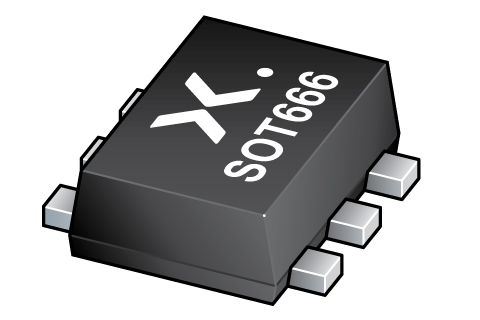
Register once, drag and drop ECAD models into your CAD tool and speed up your design.
Click here for more informationPBLS4003V
40 V PNP BISS loadswitch
PNP low VCEsat Breakthrough In Small Signal (BISS) transistor and NPN Resistor- Equipped Transistor (RET) in one package.
Features and benefits
- Low VCEsat (BISS) and resistor-equipped transistor in one package
- Low threshold voltage (<1 V) compared to MOSFET
- Low drive power required
- Space-saving solution
- Reduction of component count
- AEC-Q101 qualified
Applications
- Supply line switches
- Battery charger switches
- High-side switches for LEDs, drivers and backlights
- Portable equipment
參數類型
| 型號 | Package version | Package name | Size (mm) |
|---|---|---|---|
| PBLS4003V | SOT666 | SOT666 | 1.6 x 1.2 x 0.55 |
封裝
下表中的所有產品型號均已停產 。
| 型號 | 可訂購的器件編號,(訂購碼(12NC)) | 狀態 | 標示 | 封裝 | 外形圖 | 回流焊/波峰焊 | 包裝 |
|---|---|---|---|---|---|---|---|
| PBLS4003V | PBLS4003V,115 (934058634115) |
Obsolete |

(SOT666) |
SOT666 |
REFLOW_BG-BD-1
|
SOT666_115 |
Series
文檔 (8)
| 文件名稱 | 標題 | 類型 | 日期 |
|---|---|---|---|
| PBLS4003Y_PBLS4003V | 40 V PNP BISS loadswitch | Data sheet | 2009-02-18 |
| AN90063 | Questions about package outline drawings | Application note | 2025-03-12 |
| SOT666 | 3D model for products with SOT666 package | Design support | 2019-01-22 |
| Nexperia_package_poster | Nexperia package poster | Leaflet | 2020-05-15 |
| SOT666_mk | plastic, surface-mounted package; 6 leads; 1 mm pitch; 1.6 mm x 1.2 mm x 0.55 mm body | Marcom graphics | 2017-01-28 |
| SOT666 | plastic, surface-mounted package; 6 leads; 0.5 mm pitch; 1.6 mm x 1.2 mm x 0.55 mm body | Package information | 2022-06-01 |
| REFLOW_BG-BD-1 | Reflow soldering profile | Reflow soldering | 2021-04-06 |
| PBLS4003V | PBLS4003V SPICE model | SPICE model | 2024-08-27 |
Longevity
The Nexperia Longevity Program is aimed to provide our customers information from time to time about the expected time that our products can be ordered. The NLP is reviewed and updated regularly by our Executive Management Team. View our longevity program here.
How does it work?
The interactive datasheets are based on the Nexperia MOSFET precision electrothermal models. With our interactive datasheets you can simply specify your own conditions interactively. Start by changing the values of the conditions. You can do this by using the sliders in the condition fields. By dragging the sliders you will see how the MOSFET will perform at the new conditions set.